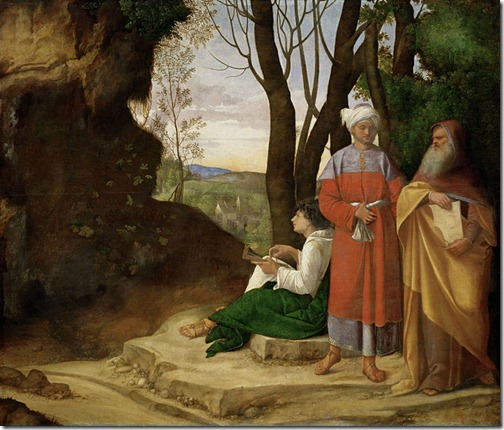A teacher of mine likes to warn me against making the history of thought a system. The hap-hazard currents of the thoughts of men do not really follow the simplistic patterns that lazy generalization likes to see in them. This is all true enough, and yet I am sure that the patterns are not altogether imaginary. So it is always a delightful surprise to me when I find a a kind of microcosm of the history of philosophy, a single thinker who manifests a general pattern in the development of his own thought. When Arturo Vasquez commented on a post of mine I took him to be just one more boring Lefebvrist, but when I then took a look at his blog, from which it at first seemed that he was a Neoplatonist, I was astonished. It was like meeting someone whom one at first takes to be a Thackeray character only to find that he is really a Dickens character. (Was es alles gibt, I said to myself). But it was when I found that he had first tried to be a Thomist and that he is presently moving from Neoplatonism back to his original dialectical materialism that I really began to wonder (Das auch noch! I exclaimed to myself), for this is precisely the pattern that Charles De Koninck describes in his Letter to Mortimer Adler:
Greek philosophy started from naive materialism (Thales . . .), pass through a stage of mathematism (Pythag.-Plato), and finally reached metaphysics with Aristotle. These phases are of course statistical rather than clear-cut. Thanks to Christianity exerting a profound extrinsic influence on metaphysics, philosophy reached metaphysical maturity in s.Thomas. From that very moment we shift back into mathematism with Scotus, Suarez, Descartes, Leibniz etc. Kant is again definitely a scientist (I take “scientist” in its french meaning). The only solution to Hegel is Marx. We have rejoined materialism, but this time no naive materialism: but a perfectly conscious and mature materialism which defines the absolute just as we define prime matter.
What really made me laugh out loud though (no offense, Mr. Vasquez), was Vasquez’s characterization of Thomism:
It is also ironic that something that started out as a means to dialogue with the pagans and heretics (Thomist philosophy) itself became a doctrine foundational to Counter-Reformation Catholicism and a measure of orthodoxy itself. That is sort of the Zizekian vulgar core of Thomism: it is meant to convince only those who believe it that it it can convince the Other who does not believe it, all the while knowing that this isn’t really the case.
This is so ironic and funny on so many different levels. No one can read more than a few pages of S. Thomas without seeing how false it is of him. It is so clear that S. Thomas is concentrated on the reality that he is trying to understand. He developes his philosophy principally for the sake of knowing the truth, and it is only a secondary aim of some of his arguments to show how one might “dialogue” with unbelievers. Now, clearly Vasquez has Thomists in mind rather than S. Thomas himself when he says they are trying to convince their own that they can convince the Other, and perhaps this is true of some Thomists; but the great irony is that it is much more true of all the attempts that I know of trying to baptize dialectical materialism. They are all about justifying one’s belief to the Lacanian big Other (in this case “mainstream” philosophy) which doesn’t actually care about them. And thus it is precisely their “Zizekian vulgarity” which leads them to abandon Thomism. For true Thomism must always be hidden, to quote De Koninck again:
I think Thomism triumphs when it lives in our world today. But I am also convinced that its life must be hidden, because it is immanence in a world that has eyes only for pure extrinsecism. Thomism is not “foris”. There is a mass of Thomists today. But in this, because it is a mass, there is “malum ut in pluribus”: Thomism has reached therein one of its most profound forms of deformation. By this I do not mean that we should hide it: I mean that ipso facto it becomes hidden as we approach it more profoundly. The purer our Thomism is, and the better we speak of it, the less it is heard. […] I insist that I am not pessimistic. I think it is enough that here and there is one who really devotes himself to the object.
The problem with most of those who try to synthesize Christianity with dialectical materialism is that they are not content with devoting themselves to the object, to reality, they cannot stand not to be heard.


Leave a comment